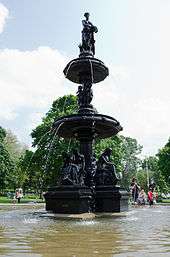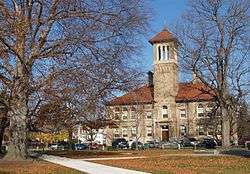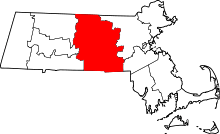Clinton, Massachusetts
| Clinton, Massachusetts | ||
|---|---|---|
| Town | ||
|
Clinton Town Hall | ||
| ||
| Nickname(s): Clintonville (Original part of Lancaster) and clowntown | ||
 Location in Worcester County and the state of Massachusetts. | ||
| Coordinates: 42°25′00″N 71°41′00″W / 42.41667°N 71.68333°WCoordinates: 42°25′00″N 71°41′00″W / 42.41667°N 71.68333°W | ||
| Country | United States | |
| State | Massachusetts | |
| County | Worcester County | |
| Settled | 1654 | |
| Incorporated | 1850 | |
| Government | ||
| • Type | Open town meeting | |
| • Town Administrator | Michael J. Ward | |
| • Board of Selectmen |
William Connolly Mary Rose Dickhaut David Sargent Jim LeBlanc Michael Dziokonski | |
| Area | ||
| • Total | 7.3 sq mi (18.9 km2) | |
| • Land | 5.7 sq mi (14.8 km2) | |
| • Water | 1.6 sq mi (4.1 km2) | |
| Elevation | 366 ft (112 m) | |
| Population (2010) | ||
| • Total | 13,606 | |
| • Density | 2,387/sq mi (919.3/km2) | |
| Time zone | Eastern (UTC-5) | |
| • Summer (DST) | Eastern (UTC-4) | |
| ZIP code | 01510 | |
| Area code(s) | 351 / 978 | |
| FIPS code | 25-14395 | |
| GNIS feature ID | 0618360 | |
| Website | www.clintonma.gov | |
Clinton is a town in Worcester County, Massachusetts, United States. The population was 13,606 at the 2010 census.
For geographic and demographic information on the census-designated place Clinton, please see the article Clinton (CDP), Massachusetts.
History

Clinton was first settled in 1654 as a part of Lancaster. It was officially incorporated as a separate town on March 14, 1850,[1] and named after the DeWitt Clinton Hotel in New York, a favorite place of the town's founders, Erastus Brigham Bigelow and his brother Horatio.[2]
Clinton became an industrialized mill town, using the Nashua River as a source for water power. In 1897, construction began on the Wachusett Dam, culminating in the filling of the Wachusett Reservoir in 1908. This flooded a substantial portion of Clinton and neighboring towns, which had to be relocated. A noteworthy feature of the Boston metropolitan public water service was begun in 1896 in the Wachusett lake reservoir at Clinton. The basin excavated there by ten years of labour, lying 385 ft. above high-tide level of Boston harbour, had a capacity of 63,068,000,000 gallons of water and was the largest municipal reservoir in the world in 1911, yet was only part of a system planned for the service of the greater metropolitan area.[3]
Part of the Central Massachusetts Railroad line abandoned in 1958 includes a tunnel near Clamshell Road.[4][5] Railroads came to the town to serve this industry, including the Boston, Clinton, Fitchburg and New Bedford Railroad (Fitchburg Branch of the Old Colony Railroad), the Central Massachusetts Railroad, and the Worcester, Nashua and Rochester Railroad (the last two later merged into the Boston and Maine Railroad). By 1890, Clinton was noted for its manufacturing of carpets and woven wire.[2]
Clinton claims to have the oldest continuously-used baseball field in the world, Fuller Field, created in 1878.[6] This challenges the claim by London, Ontario, which argues for Labatt Memorial Park, established as Tecumseh Park in 1877.[7] This is disputed by Clinton because the London field has been flooded and rebuilt twice, including a reorientation of the bases, and there is doubt Tecumseh Field was in continuous use after the 1883 flood.[8]
Geography
According to the United States Census Bureau, the town has a total area of 7.3 square miles (19 km2), of which 5.7 square miles (15 km2) is land and 1.6 square miles (4.1 km2), or 21.78%, is water. The Nashua River runs through the town, and the large Wachusett Reservoir lies to the south of the town center.
Clinton is bordered by Lancaster to the north, Bolton to the northeast, Berlin to the east, Boylston to the south, and Sterling to the west.
Demographics
| Historical population | ||
|---|---|---|
| Year | Pop. | ±% |
| 1850 | 3,113 | — |
| 1860 | 3,859 | +24.0% |
| 1870 | 5,429 | +40.7% |
| 1880 | 8,029 | +47.9% |
| 1890 | 10,424 | +29.8% |
| 1900 | 13,667 | +31.1% |
| 1910 | 13,075 | −4.3% |
| 1920 | 12,979 | −0.7% |
| 1930 | 12,817 | −1.2% |
| 1940 | 12,440 | −2.9% |
| 1950 | 12,287 | −1.2% |
| 1960 | 12,848 | +4.6% |
| 1970 | 13,383 | +4.2% |
| 1980 | 12,771 | −4.6% |
| 1990 | 13,222 | +3.5% |
| 2000 | 13,435 | +1.6% |
| 2010 | 13,606 | +1.3% |
| * = population estimate. Source: United States Census records and Population Estimates Program data.[9][10][11][12][13][14][15][16][17][18] | ||
As of the census[19] of 2000, there were 13,435 people, 5,597 households, and 3,397 families residing in the town. The population density was 2,387 inhabitants per square mile (922/km2). There were 5,844 housing units at an average density of 1,024.7 per square mile (395.6/km2).
The racial makeup of the town was 88.20% White, 2.58% Black or African American, 0.22% Native American, 0.89% Asian, 0.04% Pacific Islander, 5.95% from other races, and 2.13% from two or more races. Hispanic or Latino of any race was 11.60% of the population. Ethnic heritages include Irish, Scottish, German, Québécois, Acadian, Swedish, Italian, Dominican, Puerto Rican, Mexican, Greek, and Polish. Many emigrants from the Louisburgh area of County Mayo settled in the small town in the early 1900s, giving Clinton a mainly Irish population till this day.
There were 5,597 households out of which 28.1% had children under the age of 18 living with them, 43.7% were married couples living together, 12.7% had a female householder with no husband present, and 39.3% were non-families. 33.1% of all households were made up of individuals and 12.4% had someone living alone who was 65 years of age or older. The average household size was 2.38 and the average family size was 3.06.
In the town the population was spread out with 23.0% under the age of 18, 7.8% from 18 to 24, 32.9% from 25 to 44, 21.3% from 45 to 64, and 15.0% who were 65 years of age or older. The median age was 37 years. For every 100 females there were 92.9 males. For every 100 females age 18 and over, there were 89.6 males.
The median income for a household in the town was $44,740, and the median income for a family was $53,308. Males had a median income of $37,263 versus $30,035 for females. The per capita income for the town was $22,764. About 4.9% of families and 7.1% of the population were below the poverty line, including 5.4% of those under age 18 and 13.9% of those ages 65 or over.
Government
| County-level state agency heads | |
|---|---|
| Clerk of Courts: | Dennis P. McManus (D) |
| District Attorney: | Joseph D. Early, Jr. (D) |
| Register of Deeds: | Anthony J. Vigliotti (D) |
| Register of Probate: | Stephanie K. Fattman (R) |
| County Sheriff: | Lew Evangelidis (R) |
| State government | |
| State Representative(s): | Harold P. Naughton, Jr (D) |
| State Senator(s): | Harriette L. Chandler (D), Jennifer L. Flanagan (D) |
| Governor's Councilor(s): | Jen Caissie (R) |
| Federal government | |
| U.S. Representative(s): | Niki Tsongas (D-3rd District), |
| U.S. Senators: | Elizabeth Warren (D), Ed Markey (D) |
Library
The public library in Clinton opened in 1873.[20][21] In fiscal year 2008, the town of Clinton spent 0.99% ($325,383) of its budget on its public library—some $23 per person.[22]
Notable people
- Clarence Brown, film director
- Fred J. Douglas, former US Congressman
- Tim Fortugno, former Major League Baseball pitcher
- Carroll Gibbons, musician
- Joseph L. Gormley, chief of chemistry and toxicology for the FBI
- Sliding Billy Hamilton, member of Baseball Hall of Fame
- Mal Kittridge, baseball player[23]
- Agnes Moorehead, actress
- Jimmy Ryan,[23] major league baseball player
- Sydney Schanberg, Pulitzer Prize–winning reporter
- David Walsh, former Massachusetts governor
- Scott Young, former professional ice hockey player
- Jonathan Golas, world renowned scientist
Sites of interest
- Museum of Russian Icons
- Wachusett Reservoir Clinton Dam
- Central Park
- Clinton Business District
- South Meadow and Mossy Ponds
See also
References
- ↑ History of the Origin of the Town of Clinton, Massachusetts, 1653-1865 by Andrew E. Ford
- 1 2 Nason and Varney's Massachusetts Gazetteer, 1890, pp. 241–242
- ↑
 One or more of the preceding sentences incorporates text from a publication now in the public domain: Chisholm, Hugh, ed. (1911). "Boston, the capital of the state of Massachusetts, U.S.A.". Encyclopædia Britannica (11th ed.). Cambridge University Press.
One or more of the preceding sentences incorporates text from a publication now in the public domain: Chisholm, Hugh, ed. (1911). "Boston, the capital of the state of Massachusetts, U.S.A.". Encyclopædia Britannica (11th ed.). Cambridge University Press. - ↑ http://newenglandoddities.com/2008/05/19/tunnel-vision/#more-62
- ↑ http://www.waymarking.com/waymarks/WM5290_Boston_and_Maine_Abandoned_Tunnel_Clinton_MA
- ↑ Boswell, Randy. "Claim to oldest baseball field 'in limbo'", Saskatoon Star Phoenix (from Canwest news wire), 6 October 2008, p.B5.
- ↑ "Parks and Recreation Newsletter" (PDF). City of London. June 2008. Retrieved 2009-09-27.
- ↑ Boswell, p.B5.
- ↑ "TOTAL POPULATION (P1), 2010 Census Summary File 1". American FactFinder, All County Subdivisions within Massachusetts. United States Census Bureau. 2010.
- ↑ "Massachusetts by Place and County Subdivision - GCT-T1. Population Estimates". United States Census Bureau. Retrieved July 12, 2011.
- ↑ "1990 Census of Population, General Population Characteristics: Massachusetts" (PDF). US Census Bureau. December 1990. Table 76: General Characteristics of Persons, Households, and Families: 1990. 1990 CP-1-23. Retrieved July 12, 2011.
- ↑ "1980 Census of the Population, Number of Inhabitants: Massachusetts" (PDF). US Census Bureau. December 1981. Table 4. Populations of County Subdivisions: 1960 to 1980. PC80-1-A23. Retrieved July 12, 2011.
- ↑ "1950 Census of Population" (PDF). Bureau of the Census. 1952. Section 6, Pages 21-10 and 21-11, Massachusetts Table 6. Population of Counties by Minor Civil Divisions: 1930 to 1950. Retrieved July 12, 2011.
- ↑ "1920 Census of Population" (PDF). Bureau of the Census. Number of Inhabitants, by Counties and Minor Civil Divisions. Pages 21-5 through 21-7. Massachusetts Table 2. Population of Counties by Minor Civil Divisions: 1920, 1910, and 1920. Retrieved July 12, 2011.
- ↑ "1890 Census of the Population" (PDF). Department of the Interior, Census Office. Pages 179 through 182. Massachusetts Table 5. Population of States and Territories by Minor Civil Divisions: 1880 and 1890. Retrieved July 12, 2011.
- ↑ "1870 Census of the Population" (PDF). Department of the Interior, Census Office. 1872. Pages 217 through 220. Table IX. Population of Minor Civil Divisions, &c. Massachusetts. Retrieved July 12, 2011.
- ↑ "1860 Census" (PDF). Department of the Interior, Census Office. 1864. Pages 220 through 226. State of Massachusetts Table No. 3. Populations of Cities, Towns, &c. Retrieved July 12, 2011.
- ↑ "1850 Census" (PDF). Department of the Interior, Census Office. 1854. Pages 338 through 393. Populations of Cities, Towns, &c. Retrieved July 12, 2011.
- ↑ "American FactFinder". United States Census Bureau. Archived from the original on 2013-09-11. Retrieved 2008-01-31.
- ↑ C. B. Tillinghast. The free public libraries of Massachusetts. 1st Report of the Free Public Library Commission of Massachusetts. Boston: Wright & Potter, 1891.
- ↑ Bigelow Free Public Library Retrieved 2010-11-10
- ↑ July 1, 2007 through June 30, 2008; cf. The FY2008 Municipal Pie: What’s Your Share? Commonwealth of Massachusetts, Board of Library Commissioners. Boston: 2009. Available: Municipal Pie Reports. Retrieved 2010-08-04
- 1 2 Reichler, Joseph L., ed. (1979) [1969]. The Baseball Encyclopedia (4th ed.). New York: Macmillan Publishing. ISBN 0-02-578970-8.
-
 This article incorporates text from a publication now in the public domain: Chisholm, Hugh, ed. (1911). "Clinton, a township of Worcester county, Massachusetts, U.S.A.". Encyclopædia Britannica (11th ed.). Cambridge University Press.
This article incorporates text from a publication now in the public domain: Chisholm, Hugh, ed. (1911). "Clinton, a township of Worcester county, Massachusetts, U.S.A.". Encyclopædia Britannica (11th ed.). Cambridge University Press.
External links
| Wikimedia Commons has media related to Clinton, Massachusetts. |
- Town of Clinton official website
- Clintonmass.com, community website
- An Extraordinary Town, How one of America's smallest towns shaped the world, by A. J. Bastarache
- "A Town Called Clinton", short film created by former residents Billy and Patrick McNally
- Satellite imagery by Google Local


